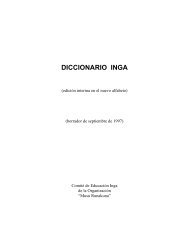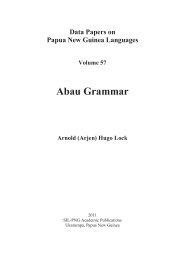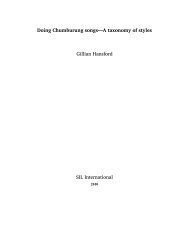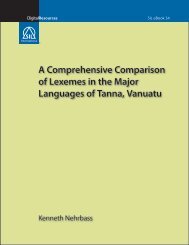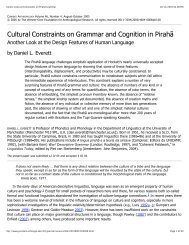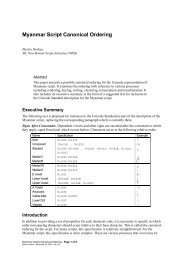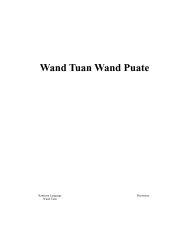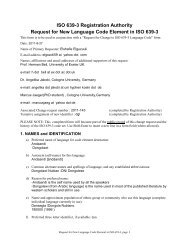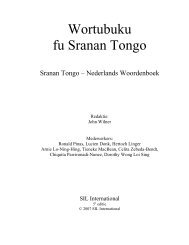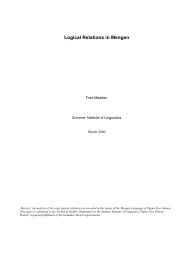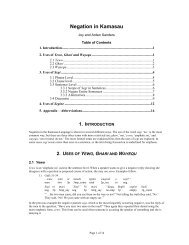The code model of communication: a powerful - SIL International
The code model of communication: a powerful - SIL International
The code model of communication: a powerful - SIL International
Create successful ePaper yourself
Turn your PDF publications into a flip-book with our unique Google optimized e-Paper software.
3. <strong>The</strong> Code Model De<strong>code</strong>d 37<br />
At the time <strong>of</strong> Saussure’s lectures, the study <strong>of</strong> language had been dominated for over 30<br />
years by (a) historical work on the language <strong>of</strong> written texts (work which had only gradually<br />
come to be distinguished from ‘philology,’ inquiry aimed not at the language but at better<br />
understanding <strong>of</strong> the text itself); (b) dialectological work based on field investigation <strong>of</strong> local<br />
dialects; (c) phonetics, which demanded increasingly minute observation in strong adherence<br />
to the positivistic spirit; and (d) psychology, the principal domain <strong>of</strong> a global perspective on<br />
language …. (Joseph 1994:3664)<br />
Dissatisfied with the direction in which the discipline seemed to be proceeding,<br />
Saussure taught an alternative perspective. Albeit unwittingly as far as Saussure was<br />
concerned, the result was to redirect the course <strong>of</strong> the entire discipline.<br />
Saussure’s problem was to delineate a study <strong>of</strong> language that would be neither historical<br />
nor ahistorical, neither psychological nor apsychological; yet more systematic than Whitneyan<br />
general linguistics [(Whitney had died in 1894)], so as to be at least the equal in intellectual<br />
and methodological rigor to the historical, psychological, and phonetic approaches. His<br />
solution was to make a strong distinction between the study <strong>of</strong> language as a static system,<br />
which he called ‘synchronic’ linguistics, and the study <strong>of</strong> language change, which he called<br />
‘diachronic’ linguistics (or, until 1908, ‘evolutive’). (Joseph 1994:3664)<br />
Harris and Taylor argue that these developments each align with a basic goal, so that<br />
the total impact was to break the surrogationalist tradition that had affected linguistic<br />
science for centuries, even from the time <strong>of</strong> the ancient Greeks: 24<br />
<strong>The</strong> whole <strong>of</strong> the Cours de linguistique générale is, in effect, dedicated to arguing that a<br />
language is not to be confused with a nomenclature. This confusion Saussure saw—rightly—<br />
as a major obstacle to understanding the systematicity <strong>of</strong> language. It is a confusion which is<br />
central to the thesis which is sometimes called ‘surrogationalism’, which has a venerable<br />
history in the Western tradition <strong>of</strong> theorizing about language. <strong>The</strong> surrogationalist views<br />
words as surrogates or proxies, having meaning by ‘standing for’ something else <strong>of</strong> a nonlinguistic<br />
nature, and the central task <strong>of</strong> elucidating how language works as consisting in<br />
showing the various types <strong>of</strong> relationship between words and what they stand for. In short,<br />
surrogationalism seeks to explain language in terms <strong>of</strong> relationship between language and<br />
what exists independently outside language. For Saussure, surrogationalism embodies a<br />
pr<strong>of</strong>ound misconception <strong>of</strong> how language works. <strong>The</strong> systematicity <strong>of</strong> language cannot be<br />
explained simply by seeking correlations between individual linguistic signs and objects, or<br />
events, or classes there<strong>of</strong> in the world outside. (Harris and Taylor 1997:221)<br />
Contemporary readers may not readily grasp the significance <strong>of</strong> Saussure’s struggle<br />
against nomenclaturism. <strong>The</strong> historical-comparative tradition, then the prevailing<br />
approach to linguistic studies, was a somewhat different science than is historicalcomparative<br />
linguistics <strong>of</strong> today. Historical-comparativists saw as their task the tracing <strong>of</strong><br />
‘evolutionary’ patterns in sound change; the linguist would identify individual words,<br />
then trace their history through time and through the various daughter languages where<br />
they were represented. In Saussure’s opinion, this was an entirely inadequate account <strong>of</strong><br />
language, if indeed it was accounting for language at all. Harris explains:<br />
Where historical philology had failed, in Saussure’s opinion, was in simply not<br />
recognising the structural nature <strong>of</strong> the sign. As a result, it had concentrated upon features<br />
24 See Harris (1980:44f.) for a general discussion <strong>of</strong> surrogationalism in Western thought.



